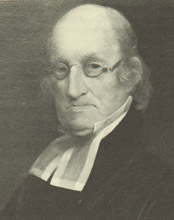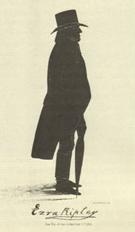
Ezra Ripley (May 1, 1751-September 21, 1841) served as minister of the First Parish in Concord, Massachusetts for almost 63 years. Although not himself an intellectual, Ripley possessed extraordinary personal and spiritual authority. He, more than any other, created the religious and moral climate of this small town which nurtured far more than its share of the writers, artists, and political figures—whose names are synonymous with the flowering of the American Renaissance. According to his step-grandson, Ralph Waldo Emerson, “he was the most public-spirited man in town.”
Ezra was born in Woodstock, Connecticut on May 1, 1751, the fifth of 19 children, several of whom became clergymen. He worked on his father’s farm in Barre, Massachusetts until he was 16, when he began a course of study which prepared him for Harvard College. His tutor was Eli Forbes, later the parish minister in Gloucester, Massachusetts to whose support the Universalists under John Murray would later refuse to contribute. At Harvard Ezra was known as “Holy Ripley.” Ripley’s Harvard class of 1776 was temporarily quartered in Concord during the British occupation of Boston. After working as a schoolteacher in Plymouth, Massachusetts for about a year, Ripley studied for the ministry with Jason Haven, pastor in Dedham, Massachusetts.
When Ripley became available to enter the ministry the pulpit in Concord was open. The previous minister, William Emerson, had obtained leave to serve as Chaplain with the Continental Army at Saratoga, but had become ill and died on his way home. After more than a year’s search, the Parish elected to call young Ripley and ordained him on November 7, 1778. He boarded with his predecessor’s widow, Phebe Bliss Emerson, ten years his senior, and married her two years later. In addition to her five children, Ezra and Phebe had three more: Samuel, Daniel, and Sarah.
Samuel, husband of Sarah Alden Bradford Ripley, became the minister in Waltham, Massachusetts. In his early years the minister’s pay from the Town was meager; so to support his family, Ezra worked three days a week at farming the land around the Old Manse. In later years he was especially proud of the fruits of his orchard.
Ripley performed the function of parish minister well during his long tenure. He exemplified the traditional Massachusetts image of the minister as the chief citizen of the town, the person entrusted to clarify and transmit the moral precepts upon which the well being of society was believed to depend. Though strict as a guardian of village morals, he interpreted these liberally. For example, a parishioner complained to him about dancing lessons given to the children by the schoolmaster. Ripley replied, “Yes, I have heard of this dancing, and am pleased to notice that the children have learned a great deal better manners than they had before.” His successor said of him, “It was in the devotional and pastoral duties of his office that he especially excelled.” He knew and cared for everyone in town. According to Emerson, he had “an eminent skill…in saying difficult and unspeakable things; in delivering to a man or woman that which all other friends had abstained from saying.” His imposing presence in local society and before God was recorded by Senator George Frisbie Hoar: “He addressed the Deity as a believer in an immediate answer to prayer, and with a certain sense of responsibility as a petitioner, conscious that he was himself a person to whom God had long been wont to listen, and that he must not use his great influence lightly.”
Ripley’s theology was neither controversial nor deep; his was a simple and undoubting faith. According to Emerson, “By education, and still more by temperament, he was engaged to the old forms of the New England Church.” It was Emerson’s impression that “[Ripley] and his coevals seemed the rear-guard of the great camp and army of the Puritans.” Ripley’s theological views evolved imperceptibly during the course of his long ministry. He began his ministry as an Arminian, and eventually came to reject the doctrine of the Trinity. He was greatly grieved when, in 1825, a group of parishioners petitioned to leave the First Parish and form an orthodox congregation. His moderating influence had, however, delayed the arrival of the Unitarian controversy in Concord for a number of years.
In 1799 Ripley encouraged the town to set up a school committee, of which he was one of the first elected members, serving for seven years. He also instituted a Sabbath school in the church and in 1829 was one of the founders of the Concord Lyceum. In its first fifty years, the Concord Lyceum presented 784 lectures, 105 debates and 14 concerts. Lectures were given by distinguished visitors, as well as by Concord residents Henry Thoreau and Ralph Waldo Emerson, who gave 98. Ripley was also an active member and supporter of the local Masonic Temple and founded the first local Temperance Society. Ripley was not averse to trying to persuade his parishioners of errors in their political thinking. Discussion of the issues of the day among the leading citizens of the parish was a feature of the Sabbath evening levees held regularly at the Old Manse.

In the spring of 1828 he preached in the Congregational Meetinghouse in Washington before President John Quincy Adams, his cabinet, and many congressmen. Before Ripley left for Washington a man who had just been much entertained by his conversation was overheard to remark that “a man who could tell a story so well was company for kings and John Quincy Adams.”
Ripley had a strong interest in commemorating the history of the town. He lost no opportunity to query those present on the Old North Bridge on April 19, 1775, at the beginning of the Revolution, about their experiences. As a result he wrote History of the Fight at Concord, published in 1827. He loved to show visitors to the Old Manse the famous battlefield next door. In 1835 he donated the ground for the proposed monument celebrating the Revolution, to be dedicated on the bicentennial of the founding of Concord.
As Ripley grew older, to ease his burdens the town called assistant ministers: Hersey Bradford Goodwin in 1830, and Barzillai Frost in 1838, after Goodwin’s death. Ripley, however, continued active to the very end and was composing a sermon on the morning of his death on September 21, 1841. Ironically, because the First Parish building was undergoing restoration, his funeral took place in the Trinitarian Congregational Church across the brook. “The fall of this oak makes some sensation in the forest, old and doomed as it was,” Emerson wrote immediately after Ripley’s death. “Well the new is only the seed of the old. What is this abolition and Nonresistance and Temperance but the continuation of Puritan-ism, though it operate inevitably the destruction of the Church in which it grew.”
Sources
Ripley’s manuscript sermons are in the Unitarian Universalist Special Collection at the Andover-Harvard Theological Library in Cambridge, Massachusetts. Some of his letters can be found among the Emerson family papers at the Houghton Library at Harvard University. Other materials for the study of Ripley and the First Parish in Concord are at the Concord Free Public Library in Concord, Massachusetts. A number of Ripley’s sermons were published as pamphlets. Nearly half of these were sermons for ordinations and installations. He also had printed discourses for Masonic and commemorative occasions. Among the sermons with a social message were Love to our neighbour explained and urged (1800), published in protest of a hanging and to benefit the care of criminals; The obligations of parents to give their children a virtuous education (1820); and The importance of just ideas of God (1829).
The most well-known account of Ripley’s life and character is the essay, “Ezra Ripley, D.D.,” in The Complete Works of Ralph Waldo Emerson, volume 10 (1911). Among the many eulogies are A Sermon Delivered at the Funeral of the Rev. Ezra Ripley by Barzillai Frost (1841) and Death of the Aged by Convers Francis (1841). There is also a short record of Ripley’s life in Louis A. Surette, History of the Corinthian Lodge (Concord, Massachusetts, 1859). A chapter is devoted to him in Samuel A. Eliot, Heralds of a Liberal Faith, vol. 1 (1910). On the history of Ripley’s church there is Townsend Scudder, Concord: American Town (1947); Ruth R. Wheeler, Concord: Climate for Freedom (1967); John Whittemore Teele, The Meeting House on the Green: A History of the First Parish in Concord and its Church (1985); and John Wood Sweet, “The Liberal Dilemma and the Demise of the Town Church: Ezra Ripley’s Pastorate in Concord, 1778-1841,” Proceedings of the Massachusetts Historical Society (1992).
Article by Paula Robbins
Posted January 11, 2001